Family businesses remain one of the most popular forms of ownership in America. But when things go wrong, they go really wrong.By Kristina Johnson At the end of a road lined with the skeletons of old field equipment, Tony Azevedo sits in the living room of his white farmhouse and tells me not to expect much from his son Adam. "He had a breakdown," says the 62-year-old organic dairy farmer. "The Adam you met isn’t the Adam we raised." The house is a California Central Valley ode to country kitsch: Plates decorated with roosters hang on the walls; chicken-shaped salt-and-pepper shakers huddle on shelves; milk-maid figurines pose in a glass cabinet topped with silk flowers. Through the lace curtains of the front windows rises the "Old West" town that Tony built to showcase his antique collection and make money hosting cowboy-themed soirees. But if the décor is charming, the farm’s soon-to-be empty pastures are not. Sixty years after Tony’s father started the Double T dairy in Stevinson, the 600 Azevedo cows are for sale, and Tony and his son aren’t speaking to each other. Neither man will walk the thousand yards that separates their two houses in order to make peace.
Adam Azevedo looks out over what is left of the family dairy herd on the farm in Stevinson, California in March 2014. "I’m sure he thinks his dad let him down for selling out, and maybe it is my fault," Tony says, pedaling the shag carpet in front of his recliner. "But I’d like to cock him one too." When I ask Tony what advice he might have for other dairy farmers in business with their kids, he aims his fingers at his head like a pistol and shoots. It’s a gesture loaded with the frustration felt in many family businesses. Roughly 30% of American firms are family-owned, including top companies like Walmart, Mars, Inc. and Cargill. As parents reach retirement the transition of control and property to their children is so notoriously difficult that some families now call in professional "succession planners" to help avoid an all-out war. In family businesses across the country, it’s not uncommon for children to sue parents or for parents to write children out of the will. In the Azevedos’s case, the pressures of a historic drought and a dairy industry dominated by much larger players quickened the drama between father and son. But the bitterness they hold for each other is nothing if not personal. As Adam Azevedo tells me when I meet him, "The thing with a family farm is you can’t fire people or get the best guys to work for you. Family farms are only great if you have the farm paid for and you’re the one in charge."
"Nothing is working out the way I wanted it to," said Adam Azevedo. "Those who labor in the earth are the chosen people of God," Thomas Jefferson once wrote . And so began the mythologizing of the American family farm. If Europe was ruled by feudal estates, then America was a democracy of farms. It was here that a couple and their children could make their way on their own piece of earth. It was here that the family farmer watched over his own destiny. Even today, advocacy groups like Farm Aid call independent family farmers the "pillars of their communities." Almost all American farms are still owned by families and slightly fewer, 87%, rely primarily on family labor. But family firms dominate other sectors too, like construction, manufacturing, and automobiles. "Run well, family businesses can be some of the best," says Ted Clark of the Northeastern University Center for Family Businesses. "They invest for the long haul, offer long-term employment, and contribute to their communities." Clark points out that families often succeed in industries with high capital costs and low-profit margins (e.g., grocery stores and hotels). They can be more patient with profits and pay off expenses, like land, in the first generation.
Tony Azevedo spent the morning getting his cows ready to be hauled to auction. So while financial advisors love to pull out the statistic that just 30% of family businesses transition into the second generation, the fact is that that number is no worse—and arguably better— than the longevity of most non-family businesses, which don’t survive past six years. Nor is the family business model fading in the 21st century. The global consulting firm McKinsey & Company reported this year that of the "7,000 large companies expected to form in emerging markets between 2010 and 2025, 80% will be family enterprises." All that said, when a family business does close shop something additional feels at stake. It’s not just the bottom line that didn’t add up. It can also be the people—the people you’re supposed to love and be loved by. Family feuds have a deep history in commerce—from the Fords, who squabbled in court over Henry Ford II’s $350 million inheritance, to the Murdochs, who wished they weren’t related when youngest son James was nailed by the British Parliament for illegal phone hacking at News Corp. We expect bad behavior from media tycoons and billionaires, but humble family farmers aren’t always innocent either. The myth of family farms isn’t just that they are morally good, all-American, kinder to the land, or a well-oiled enterprise, but that the people on them are necessarily happy.
"Selling the cows is the equivalent of losing your left arm. It's not the end of the world, but it takes some getting used to," Tony said. The collapse of the Azevedo family farm is then both heartbreakingly specific and sadly common. In 1973, Tony was 21 and recently married. He used a $37,000 bank loan to purchase 50 cows from his dad, fair and square. By 1995, he became the first San Joaquin Valley farmer to certify his operation as organic. By then, he and his wife, Carol, had four children. (Adam is their youngest.) Putting the organic label on the farm not only meant a better way to care for the land, but also assured premium pricing and protection from the market dips of conventional dairy. The choice paid off. Tony built his herd to 600 cows. His processor, Organic Valley Co-Op, marketed smiling pictures of the Azevedo grandchildren on milk cartons. And Tony earned industry-wide respect when he helped convince the National Organic Standards Board to pass the pasture rule, mandating that organic animals spend at least 120 days on grass each year. Without the rule, organic dairies could keep their cows largely indoors, crammed into stalls like conventional operations. Eight years ago, Tony offered Adam a partnership on the farm. Milk prices were high, and the unofficial plan was for Adam to buy Tony out after a few seasons. Adam was on board with this plan, but not because he wanted to work alongside his father. "I couldn’t stand my dad even then," he says. At age 34, he’s a tall man, built thick like a draft horse, with dark hair and darker eyes. He and his wife Kristy live with their three young children within shouting distance of his parents’ front porch. When I visit the property, after two weeks of leaving messages on his cellphone, I don’t expect him to answer his door. But he does and behind him kids’ toys, fast food wrappers, and soda cans are keeled over on the floor. The kitchen counters are covered with boxes and bags and more trash, as if the nearest Walmart had swollen like a river and swept through Adam’s squat ranch house. He suggests we talk outside.
Adam Azevedo stayed in his home as the last of the family dairy cows were sold and trucked away. "I know my dad is telling everyone that I’m depressed, but that’s bullshit," Adam says, sitting across from me at a picnic table in his backyard. "The old man has dementia." In a way, this echoes what his father says of him—Tony claims that Adam is mentally unstable. They both might have a point. Adam wanted to expand the herd size and push the cows to produce more milk. He thought the farm should update to the latest technology. "The main difference between me and my dad is he still wants to farm like it’s the '50s. But in this industry, you have to get big or get out." Worse, the rains had failed for the third year in a row, stunting pastures and forcing farmers to keep their animals alive on expensive feed. Between 2012 and 2013, 170 dairies around the state shut down. With organic grain prices rising fastest of all, Adam was ready to abandon the dairy’s certification. About the only thing they agree on is the anger between them. If the Azevedos had hired a succession planner maybe they would have been able to see through the insults and contradictory claims, but as it was, neither man believed the other would compromise. That afternoon, Adam and I drive to the cemetery where his grandfather is buried. Like Adam’s carpet at home, the truck floor is a mess of discarded soda cans. Adam points to a car on the road. The driver used to farm with his brother, before they stopped speaking to each other. As we roll past fields, Adam shows me one farm and then another where families have splintered, until the ride feels like a tour of fathers who disowned sons and brothers who rejected a truce. "Farmers think they’re unique, but they’re not," says Wayne Rivers of the Family Business Institute when I ask him if other industries are as plagued by infighting. "Family issues are the number one reason family businesses of any kind fail," he says. Succession is chief among those "issues." Parents don’t want to admit their own mortality, so they wait too long to discuss inheritance. And adult children like Adam grow resentful when they have to clear decisions with Dad.
Tony Azevedo's dog Guido watches as he heads into his house. Tony plans to get out of the organic dairy business and focus on his event business, which holds Western-themed weddings and parties. "In these businesses, parents can get away with treating the next generation like kids, even if they’re middle-aged," says Rivers. Of course, there are some adult sons and daughters who act like kids or who just aren’t qualified for their positions. When families insist on hiring from within, they don’t always get the best person for the job. Ted Clark at Northeastern University argues that a failing family enterprise can sometimes save itself by bringing in an outsider. "It’s ludicrous to say, 'Only kids who are sons of baseball players can be on the team."’ But who takes over, and when, is a conversation that typically doesn’t occur until too late. According to a 2014 study by PricewaterhouseCoopers, only 16% of family firms actually have a succession plan outlining the legal, financial, and personal parameters of assuming the business. Fortunately, bad communication is at least fixable, unlike, say, a historic drought. Whether on their own or with a mediator, families can learn tools to help them navigate the inevitable. In early May, I get a call from Tony. "The cows are going," he says, his voice slow and tired. "The last truck is coming this week, if you want to see." It’s a strange thing to be invited to witness a family’s wreckage, like being asked over to watch a church burn. When I pull into the dairy a few days later, I drive past the final huddle of cows, standing in the barn. They’re the only ones left to go—the pink-eyed and the runts, destined for ground beef. All of the healthier animals left earlier, headed to a 1,000-cow dairy in Idaho whose owner, Tony explains, had been in business with his stepson until "the goddam kid turned into an asshole and started treating his dad like an idiot." It’s an epidemic of sons," Tony said when he heard. I sit with Tony while he finishes breakfast. In less than an hour, there will be no more hooves on the grass here. No more milk in the Azevedo tank. Except for a few hundred acres that Tony rented to organic sweet-potato growers, the farm will retire into a postage-stamp venue for city-slicker parties. "I fought the fight," Tony says, sounding numb. "And now I’m ready for it to all be over."
Tony Azevedo signs the paperwork to sell the last of his cows. He said he won’t get teary about it anytime soon. In the past, Tony has told me that he decided to sell the cows because of the drought or his own fatigue. Some days it was Adam’s spending that was to blame or American consumers, unwilling to pay for organic products that typically cost more to produce. But, when it came to laying blame for the fight with Adam, Tony has been unequivocal. It "is 100% my fault," he says. "I should never have partnered with him. If he had gone broke on his own that would have been his thing, not mine." Tony heads to the barn when the trailer pulls up at 10 a.m. Adam must have heard the truck turn down the driveway but he doesn’t come outside. I’ll ask him later whether he watched out his window as the animals were loaded in. "No," he’ll say, "I don’t care anymore." Months ago, Tony swore to me that he wouldn’t be able to see the animals go either. "They’ve been so good to us," he’d said then. But this morning, with his son still set against him, Tony just wants the cows gone. Maybe then his family can heal. Maybe then he can forgive himself for selling what his father worked so hard to start. Tony and the farmhands use canes to prod the animals into the carrier until the final hind leg jerkily clears the ramp and the trailer door closes. Tony doesn’t give a speech. Like one of the stoic cowboys in his movie posters, he grabs a shovel and silently pushes muck out of the barn.
Adam Azevedo holds his niece Brooklyn as his father Tony Azevedo sits with his granddaughter Bryana, at left, in his home on the family dairy farm. I walk to Adam’s house once the cows are out of sight. He opens the door in pajama pants, his hair uncombed and his face shadowed. The living room is in no better shape than before, though he tells me that he and his wife are "organizing" in case they move soon. "I want to get out of California," he says. He wants to go somewhere where he can farm on his own terms. Whatever he does next, he hopes his children won’t ask to do it with him.
This story was produced by the Food and Environment Reporting Network, an independent, nonprofit news organization focusing on food, agriculture, and environmental health. [Photos: Sarah Rice, Courtesy of FERN] |
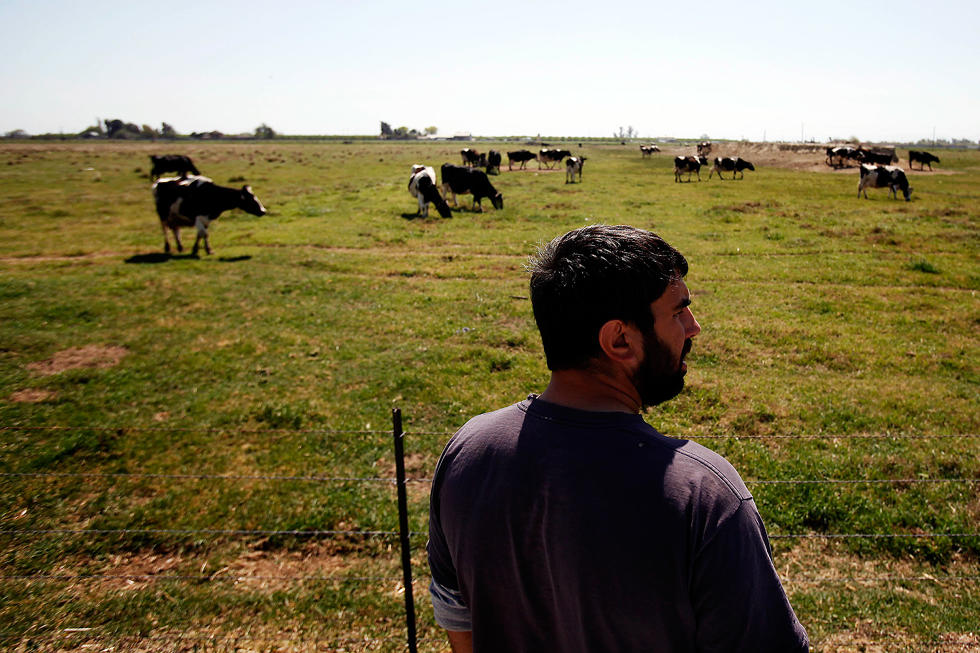
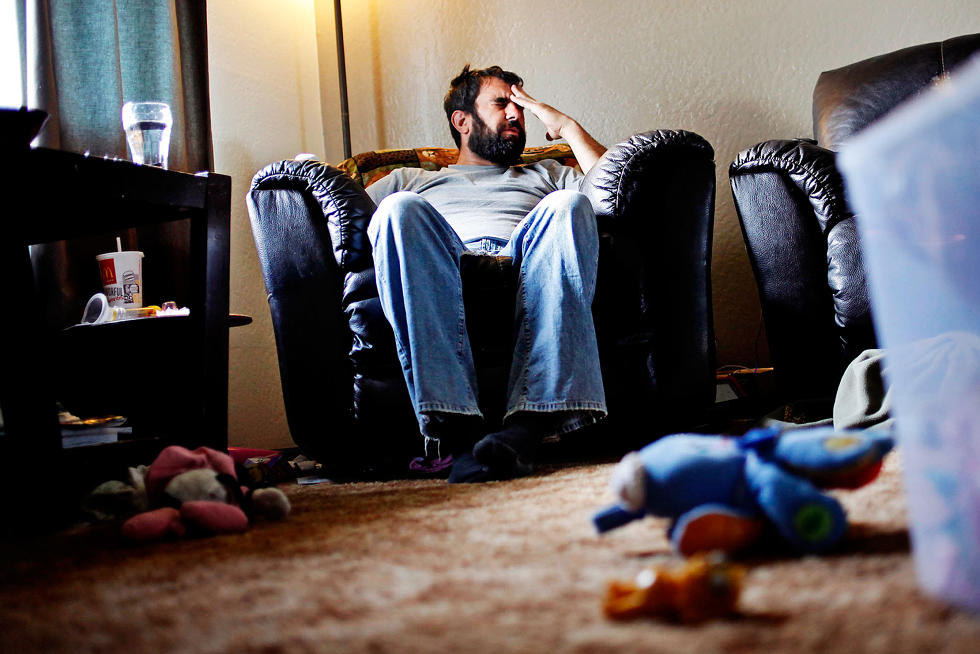
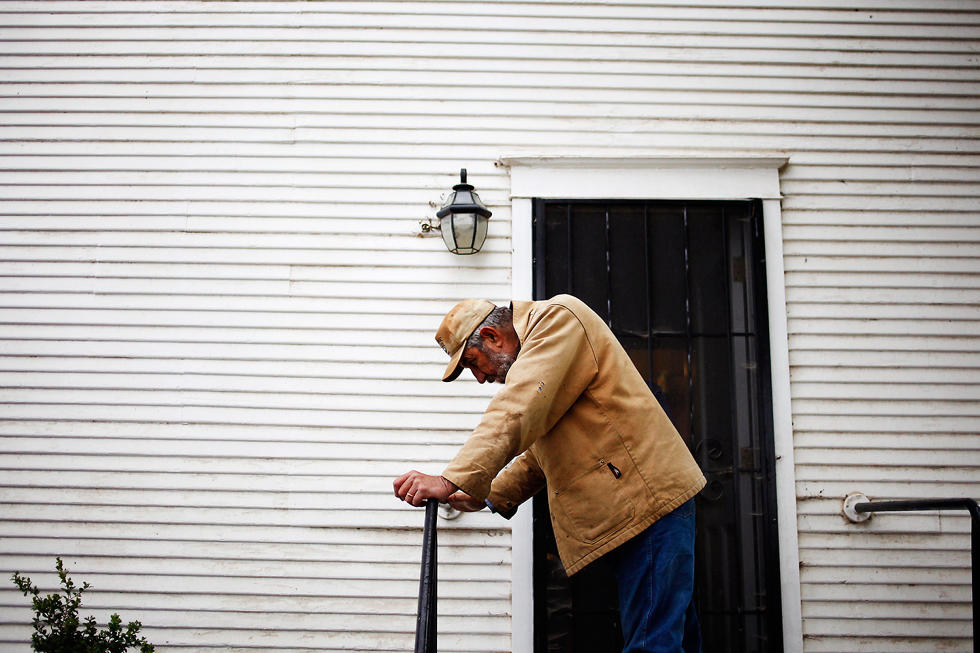
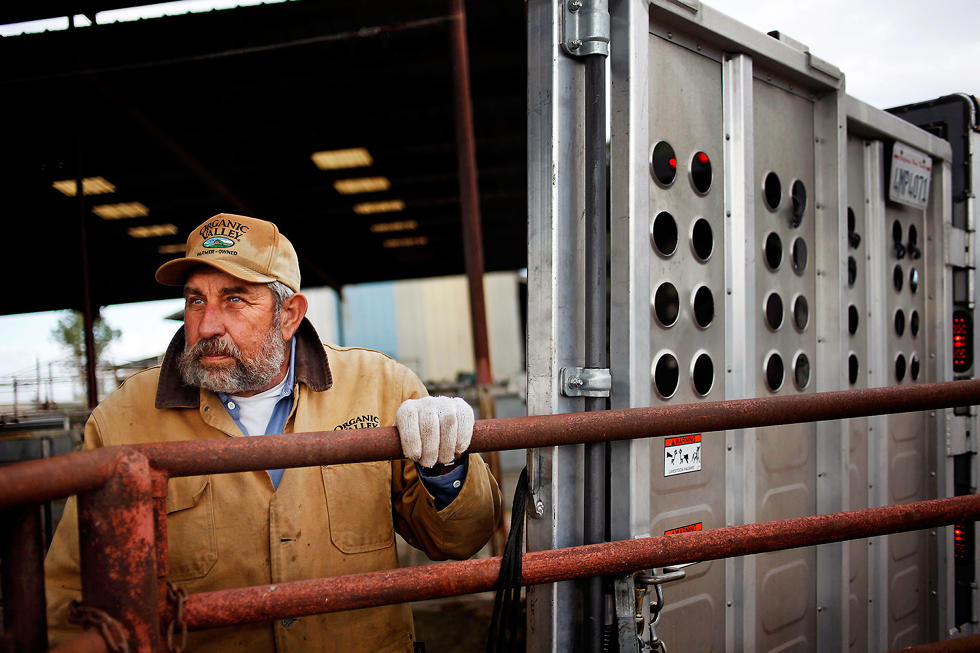
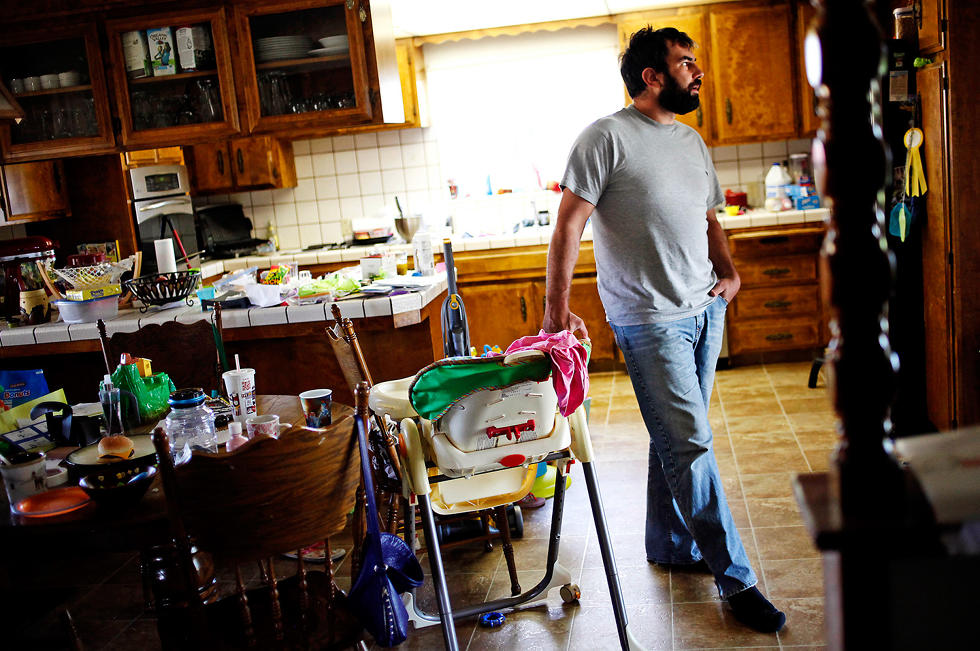

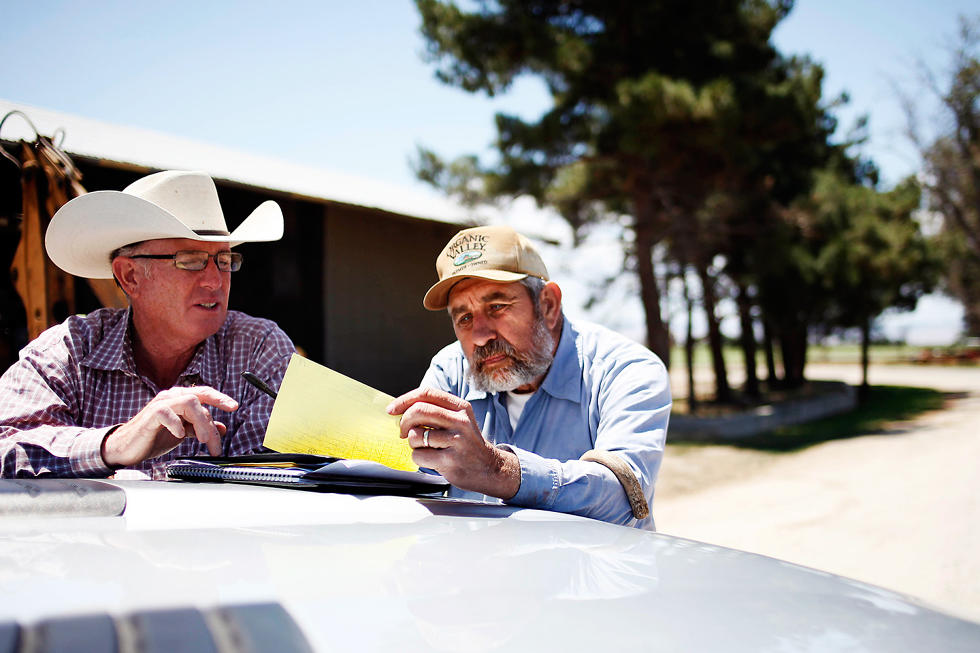
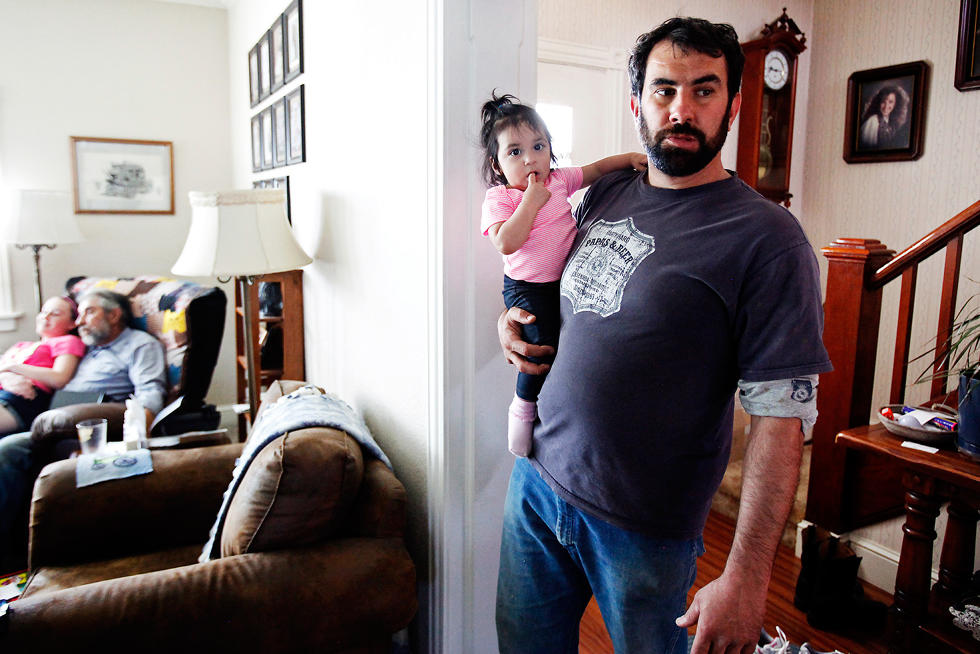

Nenhum comentário:
Postar um comentário
Observação: somente um membro deste blog pode postar um comentário.